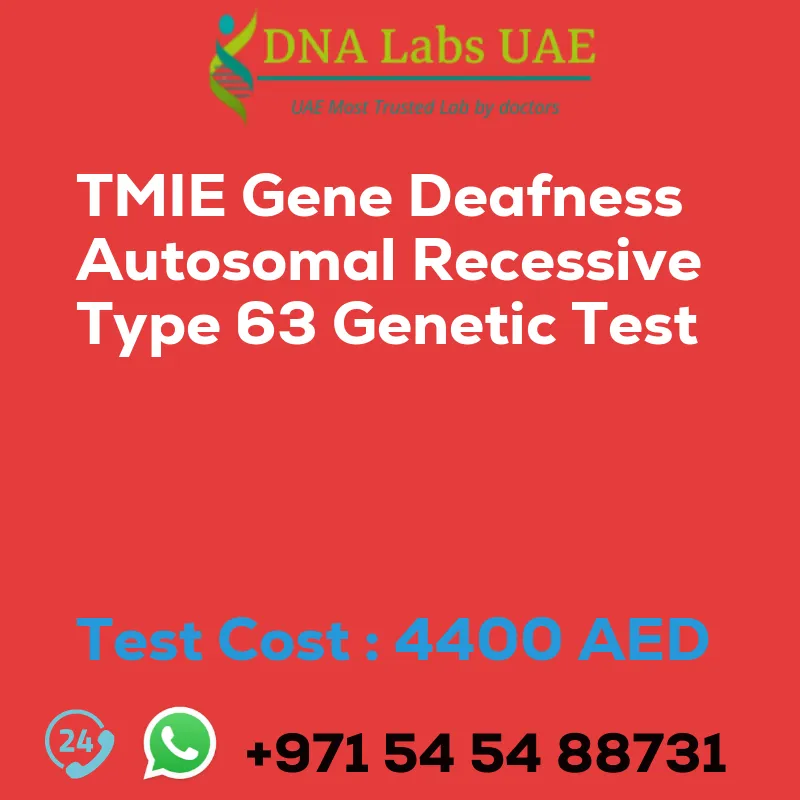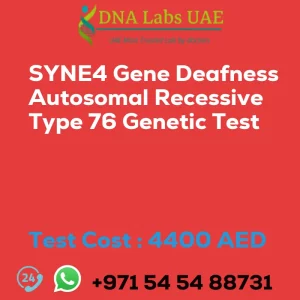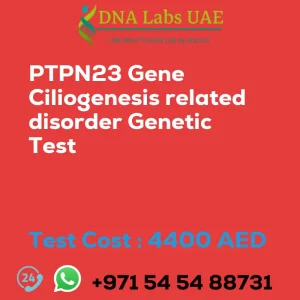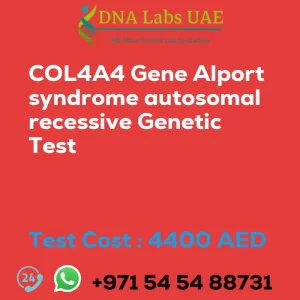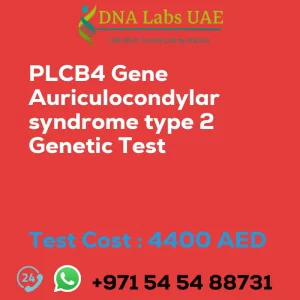TMIE Gene Deafness Autosomal Recessive Type 6 Genetic Test
Test Components:
- Price: 4400.0 AED
- Sample Condition: Blood or Extracted DNA or One drop Blood on FTA Card
- Report Delivery: 3 to 4 Weeks
- Method: NGS Technology
- Test Type: Ear Nose Throat Disorders
- Doctor: ENT Doctor
- Test Department: Genetics
Pre Test Information:
Clinical History of Patient who is going for EYA1 Gene Branchiootic syndrome type 1 NGS Genetic DNA Test. A Genetic Counselling session to draw a pedigree chart of family members affected with EYA1 Gene Branchiootic syndrome type 1 NGS Genetic DNA Test gene EYA10.
Test Details:
TMIE gene deafness, autosomal recessive type 6 (DFNB6) is a genetic condition that causes progressive hearing loss. It is inherited in an autosomal recessive manner, which means that both copies of the TMIE gene must be mutated for an individual to be affected.
NGS (Next-Generation Sequencing) genetic testing is a method used to analyze multiple genes simultaneously to identify mutations or variations that may be associated with a particular condition. In the case of TMIE gene deafness, autosomal recessive type 6, NGS genetic testing can be used to identify mutations in the TMIE gene that are responsible for the hearing loss.
NGS testing typically involves obtaining a DNA sample, usually through a blood or saliva sample, from the individual being tested. The DNA is then sequenced using advanced technology that can analyze multiple genes simultaneously. The resulting data is then analyzed by geneticists and compared to a reference database to identify any mutations or variations that may be associated with TMIE gene deafness, autosomal recessive type 6.
NGS genetic testing for TMIE gene deafness, autosomal recessive type 6 can help diagnose individuals with the condition, provide information about the inheritance pattern, and inform genetic counseling and management strategies. It can also be used for carrier testing to determine if an individual carries a mutation in the TMIE gene, which can be important for family planning and reproductive decision-making.
It is important to note that NGS genetic testing may not be available in all healthcare settings and may require a referral to a specialized genetic testing laboratory. Additionally, the results of genetic testing should be interpreted by a qualified healthcare professional or genetic counselor who can provide appropriate counseling and guidance based on the individual’s specific situation.
| Test Name | TMIE Gene Deafness autosomal recessive type 6 Genetic Test |
|---|---|
| Components | |
| Price | 4400.0 AED |
| Sample Condition | Blood or Extracted DNA or One drop Blood on FTA Card |
| Report Delivery | 3 to 4 Weeks |
| Method | NGS Technology |
| Test type | Ear Nose Throat Disorders |
| Doctor | ENT Doctor |
| Test Department: | Genetics |
| Pre Test Information | Clinical History of Patient who is going for EYA1 Gene Branchiootic syndrome type 1 NGS Genetic DNA Test. A Genetic Counselling session to draw a pedigree chart of family members affected with EYA1 Gene Branchiootic syndrome type 1 NGS Genetic DNA Test gene EYA10 |
| Test Details |
TMIE gene deafness, autosomal recessive type 6 (DFNB6) is a genetic condition that causes progressive hearing loss. It is inherited in an autosomal recessive manner, which means that both copies of the TMIE gene must be mutated for an individual to be affected. NGS (Next-Generation Sequencing) genetic testing is a method used to analyze multiple genes simultaneously to identify mutations or variations that may be associated with a particular condition. In the case of TMIE gene deafness, autosomal recessive type 6, NGS genetic testing can be used to identify mutations in the TMIE gene that are responsible for the hearing loss. NGS testing typically involves obtaining a DNA sample, usually through a blood or saliva sample, from the individual being tested. The DNA is then sequenced using advanced technology that can analyze multiple genes simultaneously. The resulting data is then analyzed by geneticists and compared to a reference database to identify any mutations or variations that may be associated with TMIE gene deafness, autosomal recessive type 6. NGS genetic testing for TMIE gene deafness, autosomal recessive type 6 can help diagnose individuals with the condition, provide information about the inheritance pattern, and inform genetic counseling and management strategies. It can also be used for carrier testing to determine if an individual carries a mutation in the TMIE gene, which can be important for family planning and reproductive decision-making. It is important to note that NGS genetic testing may not be available in all healthcare settings and may require a referral to a specialized genetic testing laboratory. Additionally, the results of genetic testing should be interpreted by a qualified healthcare professional or genetic counselor who can provide appropriate counseling and guidance based on the individual’s specific situation. |

